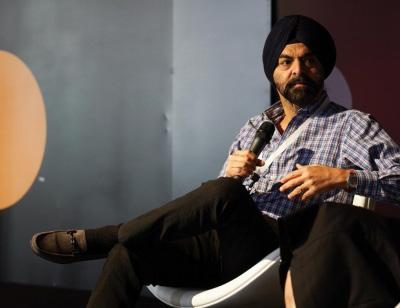
5 minute read
World Bank Prez calls for greater role for private sector in climate fight
markets to help them transition from fossil fuel to clean fuel.
"The only way forward is to find a way to get the private sector to believe that this is part of their future," said Banga, who took charge on June 2 as the 14th President of the World Bank, to CBS news.
Advertisement
Retail inflation falls to 4.25% in May as food prices slide
Washington, June 12 (IANS) Ajay Banga, the World Bank's new President, called for the private sector to play a larger role to help emerging countries in their battle against climate change in his first interviews on Sunday.

He argued that countries -essentially of the developed world, the World Bank, philanthropies and multilateral development banks (MDBs) will not be enough to meet the requirements of the emerging
He spoke also to CNN and made a similar pitch for scaling up private sector participation.
"What I think we have to do is... to find ways in the MDB system to think of a different playbook -- to take on the risks that they cannot take on," he added.
Banga is the first IndianAmerican to hold this position and called himself "Made in India" in the CNN interview, when he asked about the need for someone other than an American should lead the World Bank, which has always been headed by an American in an unwritten agreement with Europe, which, in return, gets to name the head of the International Monetary Fund. Banga said he was born and raised in India and worked in both the developed and developing world and, thus, embodies the kind of diversity people may want to see at the leadership level. Developing and less developed countries have long argued that in order to transition to clean energy they need help in resources and technology from the developed countries who caused most of the global warming with large-scale and unregulated industrialisation. And a climate fund set up to that effect has fallen way short of the committed targets.
DGCA streamlines approval process for Indian airlines to new int’l destinations
New Delhi, June 12 (IANS) In a move aimed at facilitating the expansion of Indian airlines' international operations, the Directorate General of Civil Aviation (DGCA) has announced the streamlining of the approval process for Indian carriers to start flying to new foreign destinations.
The DGCA in a statement said that it has conducted a comprehensive review of the existing regulatory requirements in consultation with stakeholders, resulting in a significant reduction in the checklist that the airlines must comply with. Previously, Indian airline operators were subject to a
33-point checklist that assessed their preparedness for operations in a new foreign destination.
"However, in an effort to simplify and expedite the process, the DGCA has now rationalized the checklist to a concise 10-point assessment that specifically focuses on an airline's readiness for the intended operations. This revision eliminates generic and redundant provisions from the previous checklist, aiming to reduce the documentation and compliance burden on the operators," as per DGCA. The revised checklist covers essential aspects related to an airline's preparedness for launching services to a new international destination. It is expected to significantly streamline the approval process, allowing Indian carriers to expand their global footprint more efficiently.
"The objective of this rationalization is to simplify and facilitate the process for Indian carriers to start a new international destination and would significantly reduce the documentation/compliances required to be submitted by the operators. This systemic reform comes at a time when the Indian carriers are poised to expand their international footprint," the DGCA added.
Mumbai Airport’s 2nd runway gets a new ‘carpet’ for safety, efficiency
and safe landing/take-off of aircraft.
portions by laying some 72,500 tonnes of asphalt.
New Delhi, June 12 (IANS) India's retail inflation, which is measured by consumer price index (CPI), fell to 4.25 per cent in May as food prices came down.

In April, it was 4.70 per cent. Food inflation too slid to 2.91 per cent in May from 3.84 per cent in April.
According to data released by the Ministry of Statistics and Programme Implementation, retail inflation was at a high of 7.04 per cent in May 2022, while food inflation was 7.97 per cent during the period.
This is the third consecutive month when CPI-based inflation has remained below the RBI's tolerance level, which is between 2 per cent to 6 per cent.
Prices of cereals, oil and fats, fruits, beverages as well as clothings and footwear came down in May compared to April.
Asia leads as nanometer chips redefine semiconductor industry

Mumbai, June 12 (IANS) The Chhatrapati Shivaji Maharaj International Airport here has completed the six-month long 're-carpeting' project of its secondary runway 14/32, enhancing the operational efficiency and maintaining higher safety standards for air travel, an official said here on Monday.

The CSMIA operates one of the busiest single-crossover runways in the world -- secondary runway 14/32 and the main runway 09/27 -- handling an average of 950 flights daily and it is imperative for the runways to be kept in optimal conditions for continuous
Accordingly, the re-carpeting project was taken up on December 9, 2022, and completed as per scheduled on June 10, just as the monsoon sets in, giving a meticulously structured approach to ensure smooth and efficient operations for the secondary runway.
Around 200 personnel comprising engineers and workers toiled daily for the project and the runway was closed for up to 12 hours daily, following a comprehensive schedule to complete the recarpeting within the deadline, said the official.
The work involved a runway length of 2,210 metres excluding the intersection portion, and a breadth of 75 metres, and the upgradation of all the stressed
The Adani Group-owned CSMIA adopted the widely-acclaimed 'Mill & Fill' technique for Runway 14/32 comprising carefully orchestrated steps that include precise removal of existing Airfield Ground Lighting fittings by core cutting, core filling with quick-set concrete, etc.
Finally, the comprehensive testing and commissioning were conducted after the installation of all necessary fittings, according to the official.
The newly re-carpeted runway has increased the overall safety and efficiency, the overlay process has enhanced the cross slopes to drain off surface water during the monsoon and improves the runway's friction value.
New Delhi, June 12 (IANS) Nanometer chips, particularly those under 10nm, are revolutionizing the semiconductor industry and as the semiconductor landscape continues to evolve, there is a shift in the industry's center of gravity towards Asia, a report said on Monday.
TSMC, the world's largest semiconductor foundry, has unveiled advancements in 2nm technology and new additions to its 3nm family. Its 2nm technology is slated for production in 2025.
"The nanometer chip revolution is here to rewrite the rules of technology. Unleashing a power surge in the AI realm, 5nm chips, for instance, are redefining speed and efficiency across industries," said Kiran Raj, Practice Head of Disruptive Tech at GlobalData, a leading data and analytics company. "They are turbocharging generative AI, making edge computing nimbler, fuelling smarter consumer devices, driving autonomous vehicles into the future besides influencing healthcare and quantum computing," Raj added. Samsung aims to mass-produce 2nm chips by 2025 and 1.4nm chips by 2027, leveraging its success with 3nm technology ahead of TSMC.
To support this, Samsung plans to triple its sub-10nm chip production capacity by 2027, which includes a new manufacturing line in Texas, the US.
Intel's 4 process, equivalent to 7nm, is production-ready, while Intel 3, analogous to 5nm, is anticipated for high-volume manufacturing in late 2023. IBM's 2nm chip packs 50 billion transistors into a fingernail-sized space.
"TSMC firmly dominates the semiconductor industry, having already transitioned to groundbreaking 5nm and 4nm processes, and is poised to usher in a new era of 3nm volume production by late 2023," said Raj. Meanwhile, Samsung grapples with significant production hurdles, yielding less than 50 per cent on its 5nm node, a stark contrast to TSMC's progress. Intel trails further behind, underscoring the fiercely competitive landscape, the report noted.









